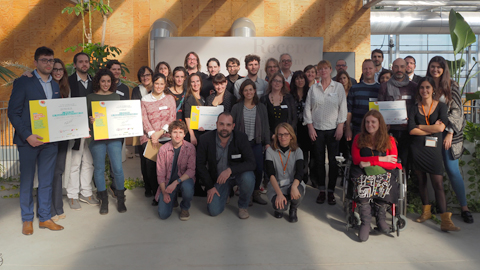The project Digitus II wins the best business idea of the UAB Research Park

02/12/2016
The UAB Research Park handed out awards to the three winning projects of the fifth edition of the Generating Ideas Programme, an initiative which gives recognition to the best business ideas in the sector of cultural and creative industries developed by UAB campus researchers and based on their research projects.
The first prize, which is 2,500 Euros and six months' incubation in the Eureka Building of the UAB Research Park, was awarded to the project Digitus II, presented by Pau Riba, Marçal Rossinyol and Juan Ignacio Toledo from the UAB Computer Vision Centre. The researchers developed a system that automatically transforms images in manuscripts into digitalised and indexed documents.
As they pointed out, "in Catalonia alone there are more than 300 archives dating back to the 9th century up until today which measure up to 840 linear kilometres of documents". The technology created by Digitus II allows automatically transcribing these documents in order to help to disseminate their content online. This would make it possible for archives belonging to municipalities, the state, ecclesiastic academics, and even businesses, to be made accessible and to share their ancient documents with the public in general by also offering access to students and academics.
The second prize was awarded to Caduf, led by Helena Kirchner, Manuel Pica, Ignacio Díaz, Núria Pacheco and Montserrat Rovira, from the UAB Department of Antiquity and the Middle Ages. Caduf consists in offering services for the study of traditional agrarian landscapes, including a diagnosis of the state of conservation and a historical and archaeological study, with the aim of later proposing solutions for its management, conservation, restoration and cultural diffusion. It is addressed to both public institutions working with cultural heritage and to agrofood companies interested in adding value to their brand and stand out against competitors, by putting value on traditional heritage landscapes.
The prize is 1,500 Euros in cash and six months' incubation in the Eureka Building of the UAB Research Park, to further develop the idea and turn it into a business opportunity.
The winners of the third prize, which includes 1,000 Euros, are researchers Marta Ávila and Harold Moreno from the Alba Light Synchrotron; Núria Morera and Ivan Campana from the UAB Department of Prehistory; and Carlos Alonso, graduate in Business Management and Administration from the UAB. Their project, entitled Zephyrus aims to improve the conservation of pieces of art, such as paintings, archives, archaeological samples or textiles. With this in mind, they have developed a professional disinfection kit which uses anoxia to eliminate microorganisms present in elements of heritage in a non-invasive manner. It is easy to apply and requires no specialised technical assistance, in addition to being compact, portable and environmentally-friendly.
The winning projects were chosen by a jury of experts in the assessment of business ideas formed by Marta Ysern from the Department of Business Development from the Barcelona Media Cluster (Eurecat); Roger Blanch Alsina, consultant of the BStartup programme for entrepreneurial support at Banc Sabadell; Raül Blanc, Manager of Industrial Strategy of the Government of Catalonia; Eduard Bech, Head of Communication of the Museums of Olot; Laura de Bonis Freixes, Coordinator of the CCCB International Prize for Cultural Innovation and Eduard Vandellòs, CEO and Art Director at the firm Creactivitat.
This year, the Generating Ideas Programme was organised jointly with the UAB Heritage Core and the Smart Cities CORE and received support from ACC1Ó, Eurecat and the National Archive of Catalonia.